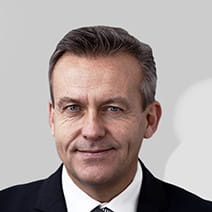It is looking increasingly unlikely that the target to keep global warming to a maximum increase of 1.5C is going to be achieved. This target was agreed by almost every country in the world through the Paris Climate Agreement in 2015.
Record high temperatures have regularly been reached and there is no doubt we are changing the climate of our only planet. The consequences are predicted to be severely negative – with the added possibility of tipping points taking us into a completely new state of climate.
The energy transition has not stalled, however, and is making positive progress. Encouraging companies to decarbonise and investing in businesses that can drive forward the energy transition both have important roles to play in accelerating this progress.
We invest in a total of 22 sustainable investment themes that help make our economy cleaner, healthier and safer. These themes help us understand the shifts happening and identify potential areas of structural growth, as well as areas of secular decline to avoid.
An example of the positive developments within energy transition is coal, which is plentiful, but also dirty and dangerous. In the UK, it has fallen from 66% of the electricity generating mix to just 2% over the last 30 years. In the US, usage has dropped from 55% to 20%. It is being replaced by cheaper and easier to deploy clean wind and solar. Solar is consistently cheaper than new coal or gas-fired plants in most countries, and solar projects now offer some of the lowest cost electricity ever seen with the price of its panels falling by around 95% in the last 10 years.
The war in Ukraine has been a big catalyst to wean Europe off politically risky hydrocarbons, especially natural gas from Russia. This has spurred even greater initiatives to reduce the amount of energy we waste by promoting energy efficiency, as well as replacing fossil fuel electricity generation with economically competitive renewables. Wind turbines and solar panels overtook fossil fuels to generate 30% of the EU’s electricity in the first half of 2024.
We believe the genie is out of the bottle for renewables. The International Energy Agency observed that 2023 was a record year for the installation of renewables with 507GW, an increase of almost 50%, on the previous year. This is about 10 times the UK generating capacity.
These examples demonstrate that the era of burning things for energy is coming to an end. Therefore, it is naïve to invest in the incumbent fossil fuel industries given they are going to struggle to compete economically as well as being diametrically opposed to the aim of a huge reduction in the amount of fossil fuels we burn.
The vast majority of the technology we need to reduce emissions is available and cost competitive today. We are thus seeing the energy transition to lower carbon happening now and believe there are ways to invest in businesses driving this transition.
By understanding which companies will experience long-term structural growth from this trend, as well as if that growth will be profitable, we now see a great investment opportunity in those businesses which help move us to a much lower carbon energy system.
The first example is Sustainable Energy Efficiency Income Trust, which has unique projects in energy efficiency, waste streams and olive oil. One such project is in Spain with the olive oil industry. Only 10% of an olive is used to produce extra virgin olive oil, with the other 90% going to waste. The Sustainable Energy Efficiency Income Trust project takes the waste - olive pomace – and from that produce extra olive oil called orujo. They are then left with the waste of that process in a biomass which is used to power electricity and the heat required in the production of olive oil. At the end of the process, there is only electricity and olive oil remaining, no more waste and this is a great example of a circular economy. They are producing more olive oil without consuming any more electricity and such use of waste can be replicated for the production of other foodstuffs.
The second example is a fund called the Atrato Onsite Energy plc and a solar farm it developed last year in Northamptonshire. This site used to be a quarry and comprises about 100 acres of land. Atrato obtained planning permission and a grid connection for a solar farm. Over the course of the last year, Atrato has installed around 55,000 panels, energised the plant in January 2024 and this energy is now supplying Britvic, the drinks company. This one solar farm can decarbonise Britvic’s UK operations by 75%.
Humanity faces an enormous challenge to stabilise the climate. While we will almost certainly exceed 1.5C in warming in the coming years, every 0.1C of warming we can avoid is critical. Sustainable investing is one point of influence that people can use to accelerate the change.
KEY RISKS
Past performance is not a guide to future performance. The value of an investment and the income generated from it can fall as well as rise and is not guaranteed. You may get back less than you originally invested.
The issue of units/shares in Liontrust Funds may be subject to an initial charge, which will have an impact on the realisable value of the investment, particularly in the short term. Investments should always be considered as long term.
The Funds managed by the Sustainable Future Team:
Are expected to conform to our social and environmental criteria. May hold overseas investments that may carry a higher currency risk. They are valued by reference to their local currency which may move up or down when compared to the currency of a Fund. Hold Bonds. Bonds are affected by changes in interest rates and their value and the income they generate can rise or fall as a result; The creditworthiness of a bond issuer may also affect that bond's value. Bonds that produce a higher level of income usually also carry greater risk as such bond issuers may have difficulty in paying their debts. The value of a bond would be significantly affected if the issuer either refused to pay or was unable to pay. May encounter liquidity constraints from time to time. The spread between the price you buy and sell shares will reflect the less liquid nature of the underlying holdings. May, under certain circumstances, invest in derivatives, but it is not intended that their use will materially affect volatility. Derivatives are used to protect against currencies, credit and interest rate moves or for investment purposes. There is a risk that losses could be made on derivative positions or that the counterparties could fail to complete on transactions. The use of derivatives may create leverage or gearing resulting in potentially greater volatility or fluctuations in the net asset value of the Fund. A relatively small movement in the value of a derivative's underlying investment may have a larger impact, positive or negative, on the value of a fund than if the underlying investment was held instead. The use of derivative contracts may help us to control Fund volatility in both up and down markets by hedging against the general market. The use of derivative instruments that may result in higher cash levels. Cash may be deposited with several credit counterparties (e.g. international banks) or in short-dated bonds. A credit risk arises should one or more of these counterparties be unable to return the deposited cash. Outside of normal conditions, may hold higher levels of cash which may be deposited with several credit counterparties (e.g. international banks). A credit risk arises should one or more of these counterparties be unable to return the deposited cash. May be exposed to Counterparty Risk: any derivative contract, including FX hedging, may be at risk if the counterparty fails. Do not guarantee a level of income.
The risks detailed above are reflective of the full range of Funds managed by the Sustainable Future Team and not all of the risks listed are applicable to each individual Fund. For the risks associated with an individual Fund, please refer to its Key Investor Information Document (KIID)/PRIIP KID.
DISCLAIMER
This is a marketing communication. Before making an investment, you should read the relevant Prospectus and the Key Investor Information Document (KIID), which provide full product details including investment charges and risks. These documents can be obtained, free of charge, from www.liontrust.co.uk or direct from Liontrust. Always research your own investments. If you are not a professional investor please consult a regulated financial adviser regarding the suitability of such an investment for you and your personal circumstances.
This should not be construed as advice for investment in any product or security mentioned, an offer to buy or sell units/shares of Funds mentioned, or a solicitation to purchase securities in any company or investment product. Examples of stocks are provided for general information only to demonstrate our investment philosophy. The investment being promoted is for units in a fund, not directly in the underlying assets. It contains information and analysis that is believed to be accurate at the time of publication, but is subject to change without notice. Whilst care has been taken in compiling the content of this document, no representation or warranty, express or implied, is made by Liontrust as to its accuracy or completeness, including for external sources (which may have been used) which have not been verified. It should not be copied, forwarded, reproduced, divulged or otherwise distributed in any form whether by way of fax, email, oral or otherwise, in whole or in part without the express and prior written consent of Liontrust.
















